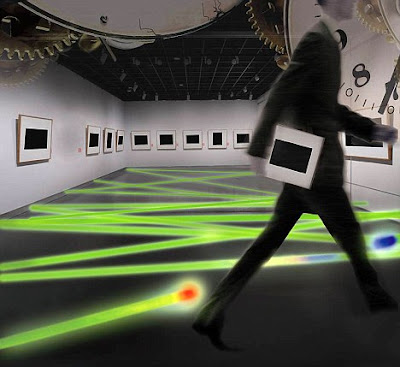First Demonstration of Time Cloaking
Off the clock: Scientists create cloaking device that 'hides' whole events - making time itself disappear
Most of the human race don't have any problem making time disappear - but scientists have cracked a very hi-tech way of doing exactly that.Scientists have developed a 'temporal cloaking' device that can hide events from view.
The demonstration 'hid' events for 40 trillionths of a second - or 40 picoseconds - by speeding up and slowing down different parts of a light beam.
The different parts of the light beam were then put back together, so that any observers could not detect what happened during the 'hidden' time.
The information is simply not there to be read or reconstructed.
So far, the technique only works on periods of 0.00012 of a second - so the police can probably rest easy, as evildoers would have to move far faster than human beings ever could to 'conceal' their actions.
Instead, the 'hidden' fractions of a second could be used for ultra-secure communications.
The scientists think that the technique could even be combined with recent advances in optical 'cloaking' - to hide an event in both space and time.
Professor Robert Boyd and Dr Zhimin Shi, of Rochester University in New York, reviewed the paper for the journal and said: ‘As if the idea of a device that makes an object seem invisible was not mind-boggling enough, researchers have now demonstrated a system that can conceal an event in time.
‘Because spatial and temporal cloaking work in different physical dimensions - space and time, respectively - there is no fundamental reason why the two techniques cannot be combined so that full spatial-temporal cloaking could be turned on or off at will.
‘Nonetheless, what Fridman et al. have demonstrated as a first temporal cloaking device could already be useful in some applications, such as enhancing the security of communication in fibre-optic systems.
‘Future directions may include increasing the cloaking time towards the order of microseconds to milliseconds, and building a device that can work simultaneously for incident light coming from different directions.’
They were able to conceal time for 40 trillionths of a second - or 40 picoseconds - by speeding up and slowing down different parts of a light beam.
Theoretically, anything happening in that tiny gap would be invisible and undetectable, because it would not exist in our perception of time.
The device could be used for ultra-secure communications - or, in one sci-fi scenario, could even be combined with an optical invisibility device, cloaking the user from both space and time, researchers say.
The effect is achieved using a split time-lens that breaks light up into slower and faster 'components' - thereby creating a tiny temporal gap.
Unlike other cloaking devices that work by bending light around objects, this works by compressing the light passing through a fibre optical cable with a special lens that causes some to speed up and some to slow down.
This makes the waves divide and another lens a little further up the cable then causes the light to be put back together.
The result is light emerging from the end of the cable that appears to be unaltered which means for the space between the lenses things have or could have gone on - with no record of it occurring.
Professor Moti Fridman, of Cornell University in New York, and colleagues said a 'time hole' in the probe beam hides the occurrence of an event from the observer.
They said: ‘This approach is based on accelerating the front part of a probe light beam and slowing down its rear part to create a well controlled temporal gap - inside which an event occurs - such that the probe beam is not modified in any way by the event.
‘The probe beam is then restored to its original form by the reverse manipulation of the dispersion. ‘In summary we have presented the first experimental demonstration of temporal cloaking that successfully hides an event from a probe beam in the time domain.
‘Our results represent a significant step towards obtaining a complete spatio-temporal cloaking device.’ Physicists have already found ways to make invisibility cloaks by distorting electromagnetic fields and steering light around a volume of space so that, essentially, anything inside this space is invisible.
Prof Fridman's researchers were able to take that idea a step further and cloak time.
They built a device that has two lenses called an electro-optic modulator. Next, they sent a beam of light through the lenses. The first lens compressed the light, while the second lens decompressed it, leaving a short gap or hole, in time where any event went unrecorded.
To the naked eye, light coming out of the second time-lens appeared uninterrupted, as if no distortion had occurred.
In essence, between the two lenses exists a space-time void that cloaks any changes occurring in the short amount of time it takes the light to pass through both lenses.
If coded messages could be hidden in a series of these cloaks it would be very difficult to intercept them - making for very secure communications.
On the other hand if such a hidden time lag could be made to pulse on and off it could be used to intercept data passing through without there being a record of it.
And if the technology could be expanded in theory you could step between two lenses and do anything you wish and it would never be recorded in time - for the rest of the world it would never have happened.
But the researchers whose breakthrough is reported in Nature don't expect the technique could ever produce a gap that lasts any longer than 0.00012 of a second - not nearly enough time to do anything worth hiding.
Source: http://www.dailymail.co.uk/sciencetech/article-2082266/Lets-time-warp-Scientists-create-cloaking-device-hide-events.html#ixzz1ibPwFa1b






